
In the AAN 2022 presidential plenary session, a trio of neurologists discussed a variety of issues stemming from the COVID-19 pandemic and how they impacted research efforts in neurological diseases.

In the AAN 2022 presidential plenary session, a trio of neurologists discussed a variety of issues stemming from the COVID-19 pandemic and how they impacted research efforts in neurological diseases.

The Pharma Two B therapy combines a dopamine agonist, pramipexole, and an MAO-B inhibitor, rasagiline, and has shown significant improvements on UPDRS total scores and ESS scores for untreated patients with PD.

At week 26, patients on ABBV-951 had mean increases of 3.24 hours in ON time and decreases of 2.94 hours of OFF time, which was similar to previously reported studies.
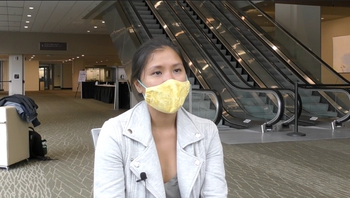
The resident physician at Montefiore Medical Center shared her experience with the novel and standardized quick examination tool and the data presented at AAN 2022. [WATCH TIME: 3 minutes]
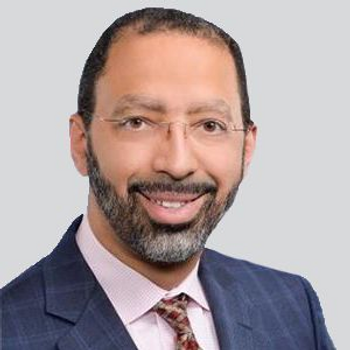
One-year data from the single-arm phase 3b CONSONANCE trial (NCT03523858) suggest that the Genentech agent (Ocrevus) resulted in low levels of disease activity and improved cognitive performance in those with secondary and primary progressive multiple sclerosis.

In an AAN 2022 Hot Topics plenary session, Miranda E. Orr, PhD, highlighted the potential of targeting senescent cells with senolytics as a therapeutic approach to age-related diseases such as Alzheimer disease, and detailed the ongoing phase 2 SToMP-AD clinical trial (NCT04685590).
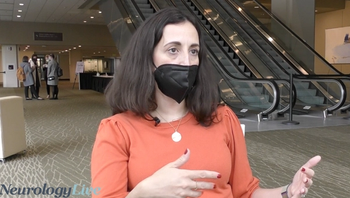
The professor of neurology at NYU Langone Grossman School of Medicine discussed her talk at AAN 2022 on neurological sequelae and follow-up in hospitalized and nonhospitalized patients with COVID-19. [WATCH TIME: 8 minutes]

After switching from nusinersen to Zolgensma 147 days into life, the infant scored a 64 on CHOP-INTEND score, considerably higher than what is observed in the natural history.

In an assessment including 23 patients, the novel and standardized quick neurologic examination showed excellent interrater reliability and agreement, suggesting good validity.
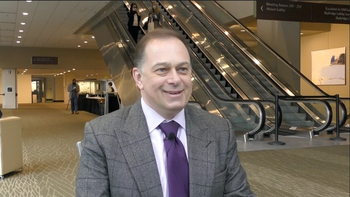
The clinical research director of the UCSF Multiple Sclerosis Center discussed new data presented at AAN on inebilizumab (Uplizna; Horizon) in neuromyelitis optica spectrum disorder. [WATCH TIME: 4 minutes]

The Bushell Chair of Neurology at the University of Sydney offered his perspective on phase 2 data of CNM-Au8 in amyotrophic lateral sclerosis and spoke to the advances that the field has made in recent years. [WATCH TIME: 3 minutes]

At 2 hours post-stimulation, 42.5% of those on the Cefaly device had absence of most bothersome symptoms compared with 34.1% of those in the sham group.

The pediatric epileptologist from Cleveland Clinic provided commentary on the changes needed to improve research and drug development in CDKL5 deficiency disorder, as well as the organizations committed to advancing the state of care. [WATCH TIME: 3 minutes]

On fluorodeoxyglucose PET, pepinemab slowed or reversed decline in metabolic activity in all 26 brain regions observed, with significant benefit found in 15 regions.

Sage Therapeutics’ investigational NMDA receptor positive allosteric modulator was well-tolerated, with signs of cognitive and functional improvements reported for patients with AD in the phase 2 LUMINARY study.

Through both 24 and 48 hours after single-dose treatment, 85% and 83% of patients, respectively, remained free of the need for rescue medication.
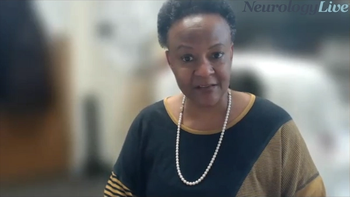
The pediatric epileptologist at Cleveland Clinic discussed the impact of ganaxolone’s approval for CDKL5 deficiency disorder and how it may create an opportunity for future pipeline agents. [WATCH TIME: 3 minutes]

Interim data from the phase 2 RESCUE-ALS trial open-label extension suggest that Clene Nanomedicine’s investigational agent, CNM-AU8, offered benefits to patients with ALS in terms of survival, in addition to prior results suggestive of slowed progression.

The Bushell Chair of Neurology at the University of Sydney shared his insight into the latest data on CNM-Au8 as a potential treatment for amyotrophic lateral sclerosis and the frameshift in treatment that it represents. [WATCH TIME: 3 minutes]

This year’s meeting, themed “the Great Neuro-Reunion,” will feature a dual virtual and in-person format, spanning 9 days and including more than 200 sessions and 11 plenaries, as well as featuring 2400 abstracts presentations.
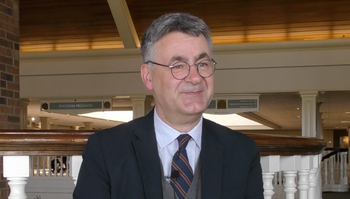
The senior investigator in the Neuromuscular and Neurogenetic Disorders of Childhood Section at NINDS shared his perspective on the data coming out of neuromuscular research and the promise of genetic medicine. [WATCH TIME: 2 minutes]

The director of neuromuscular clinical trials at Columbia University Irving Medical Center shared her perspective on the discussions that took place at MDA 2022 and the importance of collaboration among clinicians and researchers.
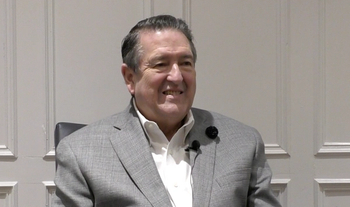
The president and CEO of the Muscular Dystrophy Association spoke about the need for increased participation in neuromuscular disorder clinical trials and the rapid therapeutic progress the field is seeing. [WATCH TIME: 4 minutes]

Eleven of the 12 individuals demonstrated at least a 50% reduction in creatine kinase, with 75% of participants reaching twice the normal range, suggesting a reduction in muscle breakdown.

More than 90% of the 65-patient cohort had evidence of normal swallowing and had no aspiration or pneumonia aspiration events reported in the phase 1 START and phase 3 STRIVE-EU and STRIVE-US trials.
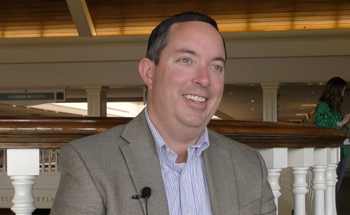
The division chief of neuromuscular disorders and vice-chair of research at Virginia Commonwealth University spoke to the ongoing success in the development of gene-mediated therapies and the challenges that come along with treating rare neuromuscular disease. [WATCH TIME: 3 minutes]

Kaplan-Meier estimates showed a 61% decreased risk of death on CNM-Au8 compared with predicted median survival from a published European Network to Cure ALS model.

The gene therapy from Novartis showed that it was both efficacious and well-tolerated in presymptomatic patients with SMA with 3 copies of SMN2, with no patients experiencing treatment-related serious adverse events.

Neurology News Network for the week ending March 19, 2022.

The chairman of the department of neurology at George Washington University discussed the reasons to be optimistic, but cautiously, about the expanding myasthenia gravis treatment toolbox. [WATCH TIME: 3 minutes]